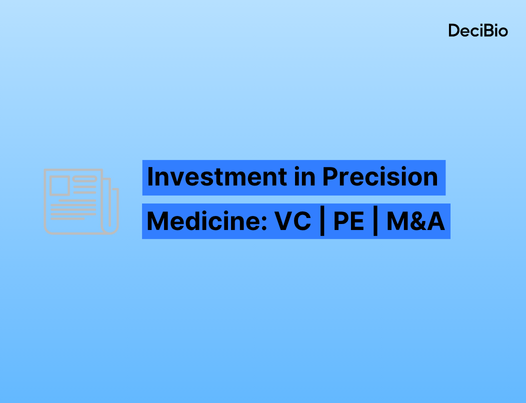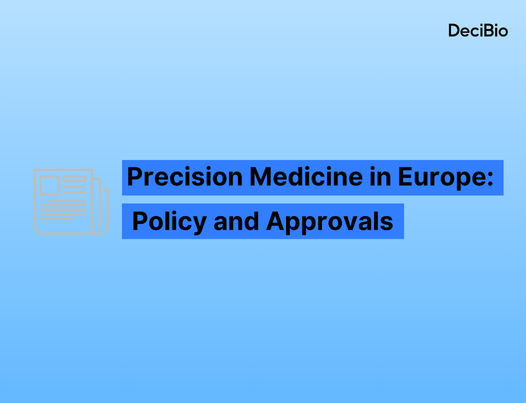Highlights & Summary
In February 2025, AI continues to drive change across drug discovery, diagnostics, and healthcare. In drug discovery, a $50M investment in Latent Labs and the release of a major open-source biological AI model are pushing the boundaries of programmable biology, while Google’s new AI Co-Scientist accelerates hypothesis testing. In diagnostics, regulatory approvals and a $112M funding boost for Harrison AI underline a trend toward more accurate, AI-driven imaging and predictive tools. Meanwhile, healthcare sees major moves with OpenEvidence hitting a $1B valuation, partnerships streamlining clinical documentation, and the launch of an AI-powered virtual nurse to support patient care.
AI in Drug Discovery
1 | $50M for AI-programmable biology: Latent Labs, led by DeepMind’s AlphaFold alumnus, to design novel proteins | Funding
2 | Open-source AI model aims to analyze, design genomic complex biological architecture | New Research
3 | Google Unveils AI Co-Scientist to Accelerate Hypothesis Generation and Scientific Discovery | New Research
AI in Diagnostics
1 | Aidoc secures FDA clearance for rib fractures triage AI solution | Regulatory
2 | Machine learning model for predicting diagnostic progression to schizophrenia or bipolar disorder | New Research
3 |$112 million Series C fuels global expansion of healthtech Harrison AI | Funding
AI in Healthcare
1 | OpenEvidence raises $75M to scale AI for doctors, hits $1B valuation | Funding
2 | Inova Health selects Abridge to unlock value from clinical conversations | Partnership
3 | Drive Health introduces Nurse Avery, an AI health assistant powered by Google | Commercial | Partnership
AI in Drug Discovery
1 | $50M for AI-programmable biology: Latent Labs, led by DeepMind’s AlphaFold alumnus, to design novel proteins | Funding
Latent Labs, an AI-driven biotech company focused on designing synthetic proteins, has emerged from stealth with $50 million in funding to advance generative biology. Founded by former DeepMind scientist Dr. Simon Kohl, the company leverages AI models to create therapeutic molecules with improved properties, accelerating drug discovery and precision medicine. Unlike traditional AI-driven protein design firms, Latent Labs offers project-based partnerships, aiming to make programmable biology more accessible to biotech and pharmaceutical companies and transform R&D by enhancing protein identification, selection, and development.
2 | Open-source AI model aims to analyze, design genomic complex biological architecture | New Research
Evo 2, the largest biological AI model to date, has been released as a free and open-source tool by researchers from the Arc Institute, Stanford University, and Nvidia. This model predicts the functional consequences of genetic variations and designs new sequences at the genome scale. Trained on 9.3 trillion DNA base pairs from 128,000 genomes, Evo 2 can recognize distant regulatory DNA sequences and identify features related to gene regulation. It has shown accuracy in predicting the effects of mutations, even outperforming other models in evaluating noncoding variants. Evo 2 can also build whole genomes based on prompts and generate long genomic sequences with regulatory regions. While it shows promise for engineering new biological tools and treatments, it still needs experimental validation, and safeguards are in place to prevent misuse, such as designing human pathogens. The code is accessible on the Arc Institute's GitHub site and integrated into Nvidia's BioNeMo framework.
3 | Google Unveils AI Co-Scientist to Accelerate Hypothesis Generation and Scientific Discovery | New Research
Google introduced AI co-scientist, a multi-agent AI system powered by Gemini 2.0, designed to assist researchers in generating hypotheses and accelerating scientific discovery. The system iteratively refines research ideas using specialized AI agents, enabling breakthroughs in drug repurposing, target discovery, and antimicrobial resistance. Early experiments validated AI-generated findings in leukemia treatment and liver fibrosis research. Google is launching a Trusted Tester Program to evaluate the system’s potential across scientific domains.
AI in Diagnostics
1 | Aidoc secures FDA clearance for rib fractures triage AI solution | Regulatory
Aidoc has received FDA clearance for its AI-powered Rib Fractures triage solution, built on the CARE1™ Foundation Model. This advanced AI technology enhances the accuracy and efficiency of detecting rib fractures, enabling faster clinical decision-making. By leveraging foundation models, Aidoc significantly reduces AI development timelines while improving generalizability across diverse medical cases. This clearance demonstrates the potential of foundation models to enhance existing AI solutions and expand their clinical impact.
2 | Machine learning model for predicting diagnostic progression to schizophrenia or bipolar disorder | New Research
A machine learning study using EHR data from psychiatric patients in Denmark demonstrated that diagnostic progression to schizophrenia and bipolar disorder can be predicted via AI. The model achieved an AUROC of 0.80 for schizophrenia prediction and 0.62 for bipolar disorder, with clinical notes proving particularly useful to inform predictions. Findings suggest AI-driven analysis of routine clinical data could help reduce diagnostic delays, enabling earlier intervention. While predictive performance for bipolar disorder was limited compared to schizophrenia, there is potential for machine learning to enhance both psychiatric diagnoses.
3 | $112 million Series C fuels global expansion of healthtech Harrison AI | Funding
Harrison.ai, a global healthtech company specializing in AI-powered medical diagnostic support, has announced its expansion into the U.S., backed by $112 million in Series C funding. Its AI radiology and pathology solutions aim to improve diagnostic accuracy, especially in early lung cancer detection. The company has already secured other FDA clearances, including Breakthrough Device Designation for a brain CT algorithm. Harrison.ai seeks to integrate AI into major healthcare systems worldwide, especially to enhance medical imaging.
AI in Healthcare
1 | OpenEvidence raises $75M to scale AI for doctors, hits $1B valuation | Funding
OpenEvidence, an AI-powered clinical decision support tool, has raised $75 million from Sequoia Capital, bringing its valuation to over $1 billion. The platform, already used by 25% of U.S. doctors, leverages AI trained on peer-reviewed medical literature, including content from the New England Journal of Medicine, to provide evidence-based insights. The funding will support further AI model refinement, content partnerships, and expanded adoption in healthcare settings. By prioritizing accuracy and trust, OpenEvidence aims to integrate into clinical workflows, distinguishing itself from general-purpose AI models prone to misinformation.
2 | Inova Health selects Abridge to unlock value from clinical conversations | Partnership
Inova Health has selected Abridge as its generative AI platform for clinical documentation, enabling over 1,000 clinicians to streamline workflows and improve patient care. Abridge’s AI-powered system converts patient-clinician conversations into structured clinical notes in real time, integrating with Inova’s electronic medical records to enhance efficiency and data privacy. By reducing administrative burden, the platform aims to allow providers to spend more time engaging with patients and improve care delivery.
3 | Drive Health introduces Nurse Avery, an AI health assistant powered by Google | Commercial | Partnership
Drive Health has partnered with Google to launch Nurse Avery, an AI-powered virtual nurse designed to enhance patient care and address the healthcare workforce shortage. Leveraging Google’s cloud infrastructure, Nurse Avery provides real-time chart reviews, appointment scheduling, and proactive patient engagement to improve efficiency and accessibility. The platform supports providers by assisting with discharge outreach, care coordination, and triage, while offering patients instant access to care plan details and secure communication with clinicians. With the U.S. facing a projected shortage of 3.2 million direct care professionals by 2026, Nurse Avery aims to scale high-quality care while maintaining HIPAA-compliant data security.

.png)







.png)

.png)


